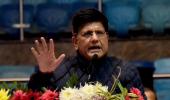India Urges ADB to Focus on Growth & Shared Prosperity
India calls on the Asian Development Bank (ADB) to prioritize growth and poverty reduction, urging the bank not to overlook its charter mandate. India also highlights its increased contribution to the Asian Development Fund.

Tbilisi (Georgia), May 5 (PTI) India on Sunday urged the Asian Development Bank (ADB) not to overlook its focus on reduction of remaining poverty while promoting sustainable growth for the member nations in the Asia Pacific region.
Making intervention at the Board of Governors Business Session at the 57th Annual Meeting of ADB, India's Temporary Alternate Governor Vikas Sheel said the bank has played a critical role in facilitating measures of faster economic development, reducing poverty and promoting regional cooperation while effectively addressing the challenges and delivery of global public goods.
"We note with concern that economic growth and dealing with the remaining poverty do not find a place in the enhanced focus areas of the ADB in the review of its Strategy 2030. We urge ADB not to overlook the ADB's charter mandate on growth and shared prosperity," he said.
He assured India's continued support to work towards accelerated inclusive and sustainable growth in Asia and the Pacific.
Due to ongoing general elections in India, Finance Minister Nirmala Sitharaman who is Governor on the board of the ADB could not attend the meeting.
Observing that ADB is expected to grow bigger, better and bolder in line with the New Delhi declaration of the G20, Sheel said, it can thus play a much bigger role in addressing the ambitious climate agenda.
"Based on the detailed recommendations made by the Independent Expert Group, appointed under India's G20 presidency, we are happy to note that ADB is proactively implementing recommendations of IEG to live up to the aspirations of being the trusted development partner of the fast-growing economies of Asia and of transforming itself into a climate bank," he said.
"A bigger and bolder ADB can produce better results if it transforms its business processes such as moving away from isolated and smaller individual projects-based funding towards multi-year transformation, and strategic and programmatic funding approaches. We hope that the ADB's new operating model will result in better operational efficiencies and a significant reduction in processing time and lending operations," he said.
ADB shall have to not only continue to pursue these reform measures but would also have to assist members in catalyzing significant private sector investments, especially for climate finance in addition to concessional financing, coupled with technology transfer in line with the global challenges funding mechanism recommended by the G 20, he added.
In line with the commitment to support the smaller economies in the region, he said, India has increased its contribution to the Asian Development Fund (ADF) 14 through USD 58.17 million.
"We are confident that the larger pool of much-needed sources resulting from a successful replenishment of ADF shall be deployed effectively and lend much-needed support to the smaller economies in the region, especially for tackling the challenges posed by the climate change," he said.
ADF is ADB's largest source of grants for operations in its poorest and most vulnerable developing member countries and is replenished every four years.
During the meeting, ADB President Masatsugu Asakawa said, the bank committed USD 23.6 billion in loans, grants, guarantees, equity investments, and technical assistance in 2023, a 15 per cent increase from the previous year.
"This included a record USD 9.8 billion in climate finance from ADB's own resources, representing 41.5 per cent of our total commitments," Asakawa said.
ADB's Private Sector Operations Department committed USD 3.8 billion for non-sovereign operations, with a significant increase in lending for frontier economies.
"ADB met its corporate financing targets for health, gender, and education, and we are on track to meet our ambition for food security financing. Asian Development Fund commitments reached USD 721 million in 2023, and we project this to increase to USD 865 million in 2024," he said.
ADB also introduced favourable concessional lending terms to small island developing members.
Observing that ADB's new operating model will continue to emphasize climate action and private sector development, Asakawa said, "To advance our shifts under the new operating model, and ensure accountability, we will also introduce new ways of working. These include new digital tools, regional work programs, and corporate performance indicators.
ADB, established in 1966, is owned by 68 members, 49 from the region. It is committed to achieving a prosperous, inclusive, resilient, and sustainable Asia and the Pacific while sustaining its efforts to eradicate extreme poverty.
India, a founding member of ADB, is now ADB's fourth largest shareholder and its top borrower since 2010.
Making intervention at the Board of Governors Business Session at the 57th Annual Meeting of ADB, India's Temporary Alternate Governor Vikas Sheel said the bank has played a critical role in facilitating measures of faster economic development, reducing poverty and promoting regional cooperation while effectively addressing the challenges and delivery of global public goods.
"We note with concern that economic growth and dealing with the remaining poverty do not find a place in the enhanced focus areas of the ADB in the review of its Strategy 2030. We urge ADB not to overlook the ADB's charter mandate on growth and shared prosperity," he said.
He assured India's continued support to work towards accelerated inclusive and sustainable growth in Asia and the Pacific.
Due to ongoing general elections in India, Finance Minister Nirmala Sitharaman who is Governor on the board of the ADB could not attend the meeting.
Observing that ADB is expected to grow bigger, better and bolder in line with the New Delhi declaration of the G20, Sheel said, it can thus play a much bigger role in addressing the ambitious climate agenda.
"Based on the detailed recommendations made by the Independent Expert Group, appointed under India's G20 presidency, we are happy to note that ADB is proactively implementing recommendations of IEG to live up to the aspirations of being the trusted development partner of the fast-growing economies of Asia and of transforming itself into a climate bank," he said.
"A bigger and bolder ADB can produce better results if it transforms its business processes such as moving away from isolated and smaller individual projects-based funding towards multi-year transformation, and strategic and programmatic funding approaches. We hope that the ADB's new operating model will result in better operational efficiencies and a significant reduction in processing time and lending operations," he said.
ADB shall have to not only continue to pursue these reform measures but would also have to assist members in catalyzing significant private sector investments, especially for climate finance in addition to concessional financing, coupled with technology transfer in line with the global challenges funding mechanism recommended by the G 20, he added.
In line with the commitment to support the smaller economies in the region, he said, India has increased its contribution to the Asian Development Fund (ADF) 14 through USD 58.17 million.
"We are confident that the larger pool of much-needed sources resulting from a successful replenishment of ADF shall be deployed effectively and lend much-needed support to the smaller economies in the region, especially for tackling the challenges posed by the climate change," he said.
ADF is ADB's largest source of grants for operations in its poorest and most vulnerable developing member countries and is replenished every four years.
During the meeting, ADB President Masatsugu Asakawa said, the bank committed USD 23.6 billion in loans, grants, guarantees, equity investments, and technical assistance in 2023, a 15 per cent increase from the previous year.
"This included a record USD 9.8 billion in climate finance from ADB's own resources, representing 41.5 per cent of our total commitments," Asakawa said.
ADB's Private Sector Operations Department committed USD 3.8 billion for non-sovereign operations, with a significant increase in lending for frontier economies.
"ADB met its corporate financing targets for health, gender, and education, and we are on track to meet our ambition for food security financing. Asian Development Fund commitments reached USD 721 million in 2023, and we project this to increase to USD 865 million in 2024," he said.
ADB also introduced favourable concessional lending terms to small island developing members.
Observing that ADB's new operating model will continue to emphasize climate action and private sector development, Asakawa said, "To advance our shifts under the new operating model, and ensure accountability, we will also introduce new ways of working. These include new digital tools, regional work programs, and corporate performance indicators.
ADB, established in 1966, is owned by 68 members, 49 from the region. It is committed to achieving a prosperous, inclusive, resilient, and sustainable Asia and the Pacific while sustaining its efforts to eradicate extreme poverty.
India, a founding member of ADB, is now ADB's fourth largest shareholder and its top borrower since 2010.
You May Like To Read
TODAY'S MOST TRADED COMPANIES
- Company Name
- Price
- Volume
- Vodafone-Idea-L
- 11.25 (+ 4.85)
- 124593459
- Mangalam-Industrial
- 0.90 (+ 4.65)
- 43018654
- Welcure-Drugs-and
- 0.50 (+ 4.17)
- 39983710
- Alstone-Textiles
- 0.29 ( -3.33)
- 27516634
- Murae-Organisor
- 0.27 (+ 3.85)
- 26520405






